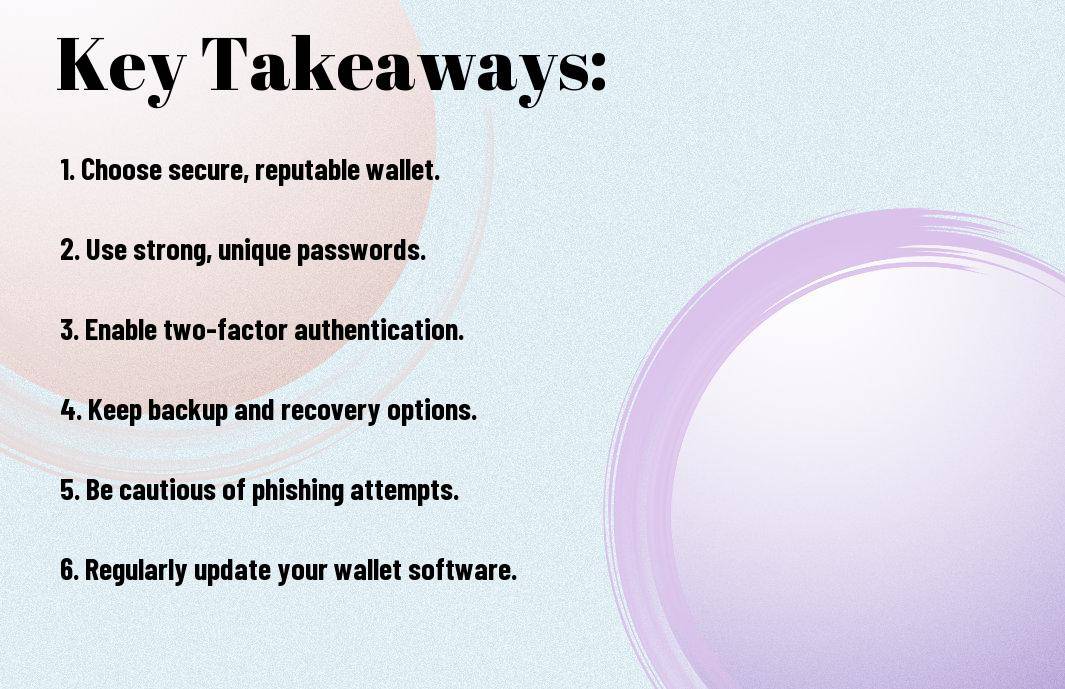
Newsletter Subscribe
Enter your email address below and subscribe to our newsletter

Enter your email address below and subscribe to our newsletter

Most individuals today are becoming increasingly involved in the world of cryptocurrencies, making it crucial to understand the importance of safeguarding your digital assets. With the rising popularity of cryptocurrencies like Bitcoin and Ethereum, securing your funds in a crypto wallet is necessary to protect against cyber threats and scams.
From the potential for hacking to the risk of losing access to your funds, having a secure crypto wallet can mean the difference between safeguarding your digital currency and losing it indefinitely. In this blog post, we will explore the various types of crypto wallets available, their pros and cons, and provide you with tips on how to choose the best wallet to protect your investments.

To truly understand the importance of safeguarding your digital currency, it’s crucial to start with the basics. Your Essential Checklist Against DeFi Scams – XRP Ledger A crypto wallet is a digital tool that allows users to store, receive, and send cryptocurrencies securely. Its primary function lies in managing the public and private keys that are necessary to access your digital assets on the blockchain. Cryptocurrency wallets do not actually store funds but provide a secure means to interact with the blockchain and authorize transactions.
To cater to different needs and preferences, there are several types of crypto wallets available in the market. Understanding the distinctions between them is vital for choosing the most suitable option for your digital assets. The common types include hardware wallets, desktop wallets, mobile wallets, web wallets, and paper wallets. Perceiving the unique features and security measures of each type is crucial for safeguarding your digital currency effectively. Importantly, let’s look into the details of each type in the table below to gain a better understanding:
| Hardware Wallets | Physical devices that store private keys offline |
| Desktop Wallets | Software downloaded and installed on a desktop or laptop |
| Mobile Wallets | Apps installed on smartphones or tablets for easy access |
| Web Wallets | Accessible through web browsers for convenience |
| Paper Wallets | Printed or handwritten document containing public and private keys |
Function
Web wallets are online platforms that allow users to access their digital assets through a web browser. These wallets are convenient for regular transactions and accessibility from any device with internet connectivity.
Crypto
When using a web wallet, it is vital to ensure that the platform has robust security measures in place to protect your funds from potential cyber threats. Be cautious about phishing attacks and always verify the authenticity of the website before entering your private keys.
Wallets
Desktop wallets are software applications that are downloaded and installed on a desktop or laptop computer. They provide users with full control over their private keys and offer a high level of security compared to online wallets.
Definition
Desktop wallets are ideal for storing large amounts of cryptocurrency and are recommended for users who prioritize security over ease of access. It is crucial to regularly update the software and back up your wallet to prevent any data loss.
Crypto
Mobile wallets are smartphone applications that enable users to manage their digital assets on the go. These wallets are user-friendly and convenient for making quick transactions using QR codes or NFC technology.
This
When using a mobile wallet, ensure that your device is secure and protected with a strong PIN or biometric authentication. Additionally, only download wallets from official app stores to avoid counterfeit or malicious applications.
Desktop
Hardware wallets are physical devices that store your private keys offline, providing an extra layer of security against potential cyber threats such as hacking or malware. These wallets are considered one of the safest options for long-term storage of cryptocurrencies.
A
When setting up a hardware wallet, ensure that you follow the manufacturer’s instructions carefully and keep your recovery seed phrase in a secure location. By storing your digital assets offline, you significantly reduce the risk of unauthorized access to your funds.
For
Paper wallets are physical documents that contain your public and private keys printed or handwritten on them. Despite being the most basic form of cold storage, paper wallets provide a high level of security as they are immune to cyber attacks.
Paper
To maintain the security of your paper wallet, store it in a secure and discreet location, away from potential physical threats such as water damage or theft. It is recommended to create multiple copies of your paper wallet and store them in separate secure locations for redundancy.
Unlike traditional physical wallets, crypto wallets come in different forms with various features and security levels. Choosing the right wallet is paramount to safeguarding your digital assets. One must consider factors like security, ease of use, and the type of cryptocurrencies supported. There are primarily five types of wallets: hardware, software, desktop, mobile, and online wallets. Each has its pros and cons, so it is necessary to assess your needs before making a decision.
One of the crucial steps in owning and managing cryptocurrencies is setting up your crypto wallet. Your wallet will be the gateway to accessing, storing, and transacting your digital currencies. Ensuring you follow the proper setup process will help prevent any loss or unauthorized access to your funds. Below is a breakdown of the step-by-step process for setting up your crypto wallet:
| Step 1: | Choose a Wallet |
| Step 2: | Download and Install Wallet Software |
| Step 3: | Create a New Wallet |
| Step 4: | Set Up Security Measures (e.g., Backup Phrase, Two-Factor Authentication) |
| Step 5: | Receive Your First Crypto Deposit |
Ensuring the safety of your wallet and the funds within it is of utmost importance. Choosing a reputable wallet provider and following best security practices will help secure your investments in the volatile world of cryptocurrencies.

Keep Crypto Wallets and Security: Safeguarding Your Digital Currency at the forefront of your mind when dealing with cryptocurrencies. Securing your digital assets starts with understanding the key components of your crypto wallet.
Wallet security is heavily reliant on public and private keys. The public key serves as your wallet address, similar to an account number, while the private key is your password. It’s crucial to never disclose your private key as it grants access to your funds. Safeguarding your private key is paramount to protecting your assets from hackers and unauthorized access.
Wallet security also involves seed phrases, a sequence of words that serve as a backup for your private key. These 12-24 word phrases are vital in recovering your wallet in case of loss or theft. Keeping your seed phrase secure and offline is crucial in maintaining the integrity of your crypto holdings.
Plus, understanding how seed phrases work and their importance in wallet security can provide an extra layer of protection for your digital assets.
Understanding multi-factor authentication (MFA) is crucial in enhancing wallet security. With MFA, users have to provide two or more forms of verification before accessing their wallet. This could include a password, a fingerprint scan, or a one-time code sent to your mobile device. Incorporating MFA significantly reduces the risk of unauthorized access to your funds.
Understanding the benefits of MFA and implementing it in your crypto wallet can significantly enhance the security of your digital assets.

| Security Measure | Explanation |
| Offline Wallets | These wallets, also known as cold wallets, are not connected to the internet, providing an added layer of security against cyber threats like hacking and phishing attacks. |
| Hardware Wallets | Hardware wallets store your private keys offline on a secure device, offering protection against malware and viruses that can target online wallets. |
To enhance security, multi-signature wallets require multiple private keys to authorize a transaction. This means that even if one key is compromised, the funds remain safe unless all required keys are accessed.
It is crucial to leverage smart contracts for added security in transactions. These contracts automatically execute terms of the agreement and help prevent fraud or third-party interference.
MultiSignature smart contracts add an extra layer of security by requiring multiple parties to sign off on transactions, ensuring that funds are only accessed with consensus from all involved parties.
Cold storage solutions such as offline wallets and hardware wallets are highly recommended for safeguarding your digital currency against online threats. Utilizing multi-signature wallets adds an extra level of protection by requiring multiple private keys to authenticate transactions. Additionally, smart contract-based security features help automate and secure transactions, reducing the risk of fraud or external manipulation. By implementing these advanced security measures, you can enhance the safety of your digital assets and protect them from potential cyber threats.
For optimal security, it is crucial to consistently update your crypto wallet software and apply patches as soon as they become available. Regular updates often include security enhancements and bug fixes that can help protect your digital assets from potential threats. Failure to update your wallet regularly may leave you vulnerable to security breaches and hacks.
Wallet security also involves being vigilant against phishing attacks, where malicious actors attempt to deceive you into providing sensitive information such as your private keys or login credentials. Wallet owners should be wary of unsolicited emails, messages, or advertisements asking for personal details, and should never click on suspicious links or download attachments from unknown sources.
Phishing attacks are a common tactic used by cybercriminals to gain unauthorized access to your wallet and steal your digital currency. By recognizing the signs of phishing attempts and avoiding engaging with potential threats, you can significantly reduce the risk of falling victim to such scams.
One of the key aspects of maintaining wallet security is implementing secure backup protocols. It is crucial to regularly back up your wallet data in encrypted formats and store them in multiple secure locations. By creating secure backups of your wallet, you can protect your digital assets in case of theft, device failure, or other unforeseen circumstances.
It is recommended to use external storage devices or secure cloud services to store your backup files securely. By maintaining proper backup protocols, you can ensure that you have access to your digital currency even in the event of a security breach or technical failure.
Despite the security measures in place, there may be instances where you encounter unforeseen circumstances such as losing access to your crypto wallet or unauthorized access. In such cases, it is crucial to have a recovery and disaster management plan in place to safeguard your digital currency.
Lost access to your crypto wallet? Don’t panic. The first step in recovering a lost wallet is to check if you have any backups or recovery phrases stored securely. Many wallets provide recovery phrases or seed words during the wallet setup process. These can be used to regain access to your wallet and recover your funds. If you cannot locate your recovery phrase, it is vital to reach out to the wallet provider’s support team for assistance.
With the rising popularity of cryptocurrencies, the risk of theft and unauthorized access to your wallet is a real concern. If you suspect that your wallet has been compromised, it is crucial to act swiftly. The first step is to freeze your accounts and report the incident to the relevant authorities. Additionally, changing your passwords and enabling two-factor authentication can help secure your wallet from future unauthorized access.
This subsection highlights the importance of immediate action in the event of theft or unauthorized access to your crypto wallet. Do not forget, staying vigilant and taking proactive measures can help safeguard your digital assets from potential threats.

Once again, the world of cryptocurrencies is evolving rapidly, and so are the technologies that support them. The future of crypto wallets is poised to see significant advancements in both security and functionality, thanks to developments in cryptography and blockchain technology.
To stay ahead of cyber threats, crypto wallet developers are constantly exploring new cryptographic techniques to enhance security. These advancements involve the use of sophisticated encryption protocols and multi-signature authentication methods, making it increasingly challenging for malicious actors to gain unauthorized access to digital assets. With enhanced security features, users can have greater peace of mind knowing that their funds are safeguarded against potential risks.
On the blockchain front, innovations such as smart contracts and decentralized finance (DeFi) are reshaping the way transactions are conducted. These developments not only offer more efficient and transparent ways to transfer assets but also bring about new considerations for wallet security. As the complexity of transactions increases, wallet providers will need to adapt and implement robust security measures to ensure the integrity of transactions in this evolving landscape.
The integration of blockchain technology into various industries also presents new opportunities and challenges for crypto wallet providers. With the rise of tokenization and non-fungible tokens (NFTs), wallets may need to support a wider array of digital assets, requiring enhancements in storage and compatibility with different blockchain networks. As the crypto ecosystem continues to expand, wallets will play a pivotal role in enabling users to seamlessly manage their digital assets across various platforms and networks.
Summing up, a crypto wallet is an necessary tool for safeguarding your digital currency. By understanding the different types of wallets available, such as hot wallets and cold wallets, users can choose the right option based on their security needs and convenience preferences. It is crucial to prioritize security measures like using hardware wallets, keeping private keys secure, and being cautious of potential scams or phishing attempts.
As the popularity of cryptocurrency continues to grow, the importance of securing digital assets becomes increasingly important. By taking the necessary precautions and using reputable crypto wallets, users can ensure that their funds are safe from hackers and unauthorized access. Investing time and effort into understanding how to properly use and protect crypto wallets can help users navigate the digital currency landscape with confidence.
A: A crypto wallet is a digital tool that allows you to store and manage your digital currencies securely.
A: Crypto wallets work by generating public and private keys that enable you to send and receive digital currencies on the blockchain.
A: There are several types of crypto wallets, including hardware wallets, software wallets, web wallets, and paper wallets.
A: To ensure the security of your crypto wallet, make sure to enable two-factor authentication, use strong passwords, and store your private keys offline.
A: If you lose access to your crypto wallet, you should immediately contact the wallet provider’s customer support for assistance in recovering your account.
A: While crypto wallets do not require personal information to set up, all transactions are recorded on the blockchain, which is a public ledger. Therefore, the transactions are not completely anonymous.
A: Some wallets support multiple cryptocurrencies, allowing you to store different types of digital currencies in one wallet. Make sure to check if your wallet is compatible with the cryptocurrencies you wish to store.